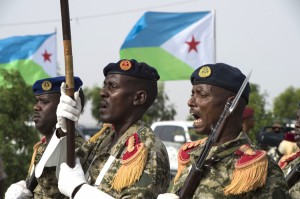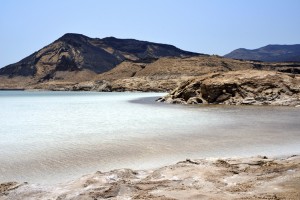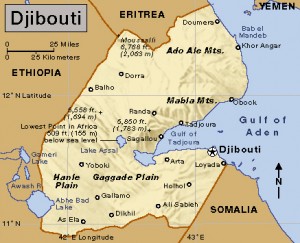Djibouti at 40
Tuesday, June 27th, 2017June 27, 2017
On June 27, 1977, forty years ago today, in a hot, dusty corner of northeastern Africa, the French Territory of the Afars and Issas became the independent nation of Djibouti. The Afars and the Issas—two traditionally nomadic ethnic groups—make up most of Djibouti’s population of nearly 1 million people. Djibouti gained independence in 1977 from France, which had controlled the Djibouti area since the 1880’s.

Soldiers shout cadences while marching in the independence day parade in Djibouti. Today, June 27, 2017, marks 40 years since Djibouti gained independence in 1977. Credit: Staff Sgt. Eric Summers Jr., U.S. Air Force
A large celebration to mark the nation’s 40th birthday took place in Djibouti city, the capital. A vibrantly dressed crowd braved the 108 °F (42 °C) temperature—typical for this time of year—to cheer a military parade featuring marching bands, high-stepping and chanting soldiers, and stunt-performing police officers. President Ismaïl Omar Guelleh and Prime Minister Abdoulkader Kamil Mohamed attended the event, as did foreign troops and dignitaries from China, France, Japan, and the United States. Those four countries have military bases in the strategically-located country, and a Saudi Arabian base will soon join them. Djibouti hosts Camp Lemonnier, the largest U.S. permanent military base in Africa.
Djibouti lies on the western shore of the Gulf of Aden. Djibouti’s location has helped make the capital a major port, and ships from all over the world regularly stop there. Strategically, control of Djibouti can determine which ships pass through the narrow Strait of Bab el Mandeb, a bottleneck for vessels traveling between the Indian Ocean and the Mediterranean Sea. The strait is one of the busiest maritime routes in the world.

The terrain of Djibouti is extremely desolate. The nation’s Lake Assal, seen here, is a salt lake that lies 509 feet (155 meters) below sea level. It is the lowest point on the African continent. Credit: © Thinkstock
France founded a coaling station in the Djibouti area in 1881. The French then created a territory called French Somaliland and founded the city of Djibouti. In 1896, Djibouti—already a prosperous port—became the territorial capital. In 1958, French Somaliland joined the French Community, an organization that linked France and its overseas territories.
In 1967, French Somaliland voted to continue its association with France and was renamed the French Territory of the Afars and Issas. But opposition to French rule steadily grew, and in May 1977, the people voted overwhelmingly for independence. The territory became the independent nation of Djibouti a month later.



